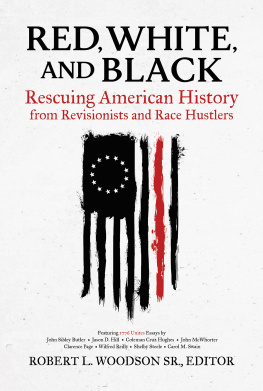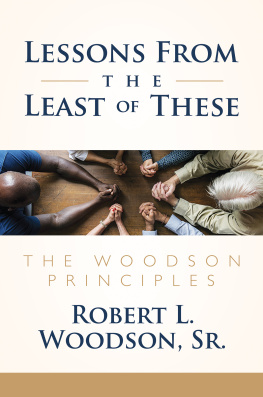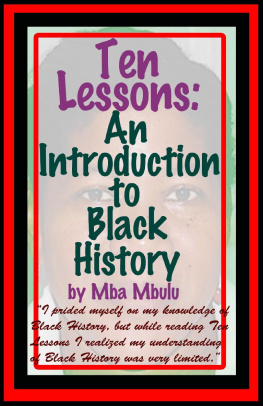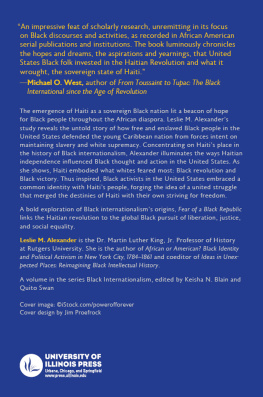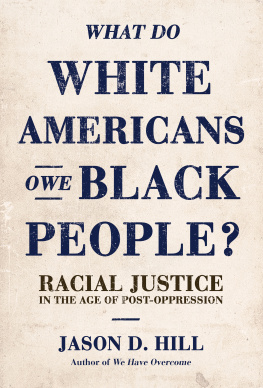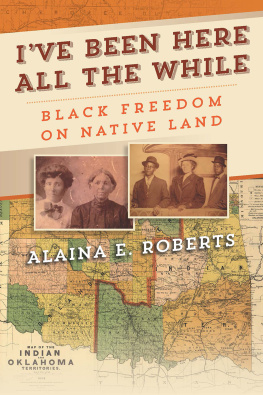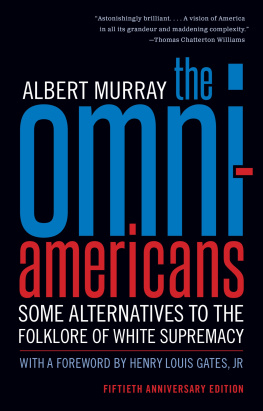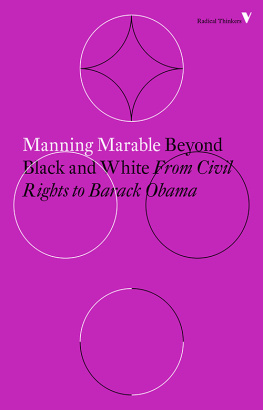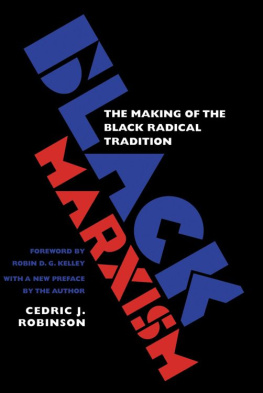
AN EMANCIP ATION BOOK
An Imprint of Post Hill Press
ISBN: 978-1-6 4293-778-7
ISBN (eBook): 978-1-6 4293-779-4
Red, White, and Black:
Rescuing American History from Revisionists and Rac e Hustlers
2021 by Robert L. Woodson Sr., Editor
All Right s Reserved
Cover Design by Ti ffani Shea
No part of this book may be reproduced, stored in a retrieval system, or transmitted by any means without the written permission of the author and publisher.


Post Hill Press
New York Nashville
posthil lpress.com
Published in the United States of America
Their statesmanship looked beyond the passing moment, and stretched away in strength into the distant future. They seized upon eternal principles, and set a glorious example in their defense. Mark them!
Frederick Douglass, referring to the Founding Fathers in his speech The Meaning of July Fourth for the Negro, delivered in Rochester, New York, on July 5, 1852.
Dedication
No nation is perfect, but Americamore than any otheris a place where people from every imaginable background have been able to pursue their dreams and realize their potential. Americans have never met a problem we are afraid to tackle or a challenge we cant overcome. In fact, those of us who have faced the most formidable challenges in life often become our strongest leaders and our greatest patriots.
This is as true of black Americans as it is anyone else. During the worst of Jim Crow, we built thriving communities full of families, churches, businesses, and countless civic institutions. On the very soil where we once toiled in forced labor, we found the seeds of our liberation.
At a time when many are trying to pull us apart by stoking grievances and sowing discord, the overwhelming majority of Americans remain devoted to our founding principles and to one another. This book is dedicated to those countless millions who love our country, despite its flaws, and long to live together in peace.
1776 Unites Mission Statement
1776 Unites is a movement to liberate tens of millions of Americans by helping them become agents of their own uplift and transformation, by embracing the true founding values of our country. 1776 Unites represents a nonpartisan and intellectually diverse alliance of hundreds of thousands of writers, thinkers, and activists focused on solutions to our countrys greatest challenges in education, culture, and upward mobility.
We acknowledge that racial discrimination existsand work towards diminishing it. But we dissent from contemporary groupthink and rhetoric about race, class, and American history that defames our national heritage, divides our people, and instills helplessness among those who already hold within themselves the grit and resilience to better their lot in life. 1776 Unites maintains a special focus on voices in the black community who celebrate black excellence and reject victimhood culture and showcases the millions of black Americans who have prospered by embracing the founding ideals of America.
We are intellectuals and journalists, entrepreneurs and grassroots activists, celebrating the progress America has made, the resilience of its people, and our future together. We seek decisive action in restoring our peoples confidence and advancing the cause of actual justice in the face of hostile messages that degrade the spiritual, moral, and political foundations of our nation.
1776 Unites is a project of the Woodson Center, a community transformation and empowerment organization founded by Robert L. Woodson Sr . in 1981.
Contents
Introduction: The Crucial Voice of 1776
By Robert L. Woodson Sr.
A Positive Vision: The Agenda of 1776
By Wilfred Reilly
The Moral Meaning of America: Two Parallel Narratives
By Jason D. Hill
Acknowledging Slaverys Limits in Defining America
By John Wood Jr.
We Cannot Allow 1619 to Dumb Down America in the Name of a Crusade
By John McWhorter
Slavery Does Not Define the Black American Experience
By Wilfred Reilly
Black Is the New Idol
By Yaya J. Fanusie
The History of 1776 Offers Hope for All Americans
By Rev. Corey Brooks
Responses to Adversity
By Robert Cherry
The Cult of Victimhood
By Harold A. Black
Living by the Grace of God and the Power of Applying Oneself
By Dean Nelson
True Freedom Comes From Serving Community and God
By Rev. DeFores t Blake Soaries Jr.
How Harlems Hellfighters Gained Their Nameand Helped Win the Great War
By Stephen L. Harris
A Dream as Old as the American Dream: Why Black Patriotism Is More Important Than Victimization
By Clarence Page
Children Achieve the Expectations We Teach: Charting a Path to a More Perfect Union Begins with Our Guidance
By Ian Rowe
From Rural Poverty to Ivy League Professor: Carol M. Swains Life Lessons
By Carol M. Swain
Closing the Black-White Educational Gap in the South in the Early Twentieth Century
By Stephanie Deutsch
An Algorithm of Success: Understanding Black America
By John Sibley Butler
Lets Arm Black Children with Lessons That Can Improve Their Lives
By Coleman Cruz Hughes
We Live in an Impure World
By Joshua Mitchell
An Excerpt from Shame
By Shelby Steele
We Must Scrap the 1619 Project for an Accurate Account of American History
By Charles Love
Critical Race Theorys Destructive Impact on America
By Carol M. Swain
Straight Out of the Black Bourgeoisie: Lessons for the Twenty-First Century
By John Sibley Butler
First Black Olympic Champion, Alice Coachman: The Little Girl from the Red Hills of Georgia
By Stephen L. Harris
Keeping the Promise of 1776
By Bob Woodson and Ian Rowe
Foreword
By Dr. Lucas E. Morel
It should never be lost sight of, that our destiny for good or for evil, for time and for eternity, is, by an all-wise God, committed to us; and that all the helps or hindrances with which we may meet on earth, can never release us from this high and heaven-imposed respon sibility.
Frederick Douglass (1848)
Always bear in mind that your own resolution to succeed, is more important than any other o ne thing.
Abraham Lincoln (1855)
F rederick Douglass and Abraham Lincoln would smile upon this book of essays. Both men exuded the Spirit of 76 and, like the essays herein, sought to reclaim the noble ideals of the Declaration of Independence to meet the challenges of their times. Each knew of the landing of Africans near Jamestown, Virginia, in 1619, and the significance of this introduction of African slavery onto American soil. In the spirit of these two champions of the timeless truths of the Declaration, 1776 Unites argues that those truths constitute the surest basis for individual prosperity and the key to reuniting a country divided over the role that race should play in its social and political life.
In the essays that follow, while hindrances are acknowledged, the authors focus on what black Americans have the power to do for themselves, their neighbors, and their country. Frederick Douglass never denied that white Americans needed to remove the barriers to our improvement, which themselves have set up, but he consistently emphasized that the main work must be commenced, must be carried on, and concluded by ourselves. He exhorted black Americans to cultivate character above all else. It not only elevated a man but also helped to undercut color prejudice against him.
Next page
